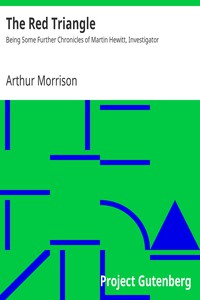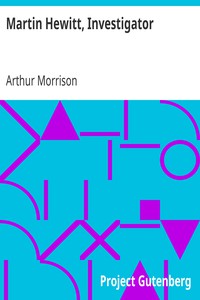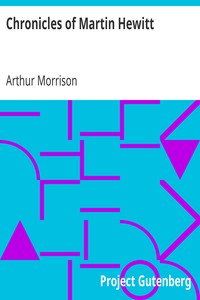The Red Triangle: Being Some Further Chronicles of Martin Hewitt, Investigator, - [best mobile ebook reader TXT] 📗

- Author: -
Book online «The Red Triangle: Being Some Further Chronicles of Martin Hewitt, Investigator, - [best mobile ebook reader TXT] 📗». Author -
I set out accordingly some little time after a breakfast even later than ordinary, and called in at Hewitt's office on my way downstairs, to say that I should not be lunching at our usual place that day.
"No," Hewitt answered, "nor shall I, I expect. I'm off to the City, at once. I have an urgent message to go immediately to Kingsley, Bell and Dalton's, in Broad Street, where a big bond robbery has just been discovered. Perhaps I can give you a lift in my cab?"
We hurried off together accordingly. Hewitt knew nothing of the case he had to examine, and so could tell me nothing, beyond the short urgent request that he would come at once, and that the matter involved the loss of bonds to a very large amount; and he dropped me at a convenient spot, whence my walk to the hospital was but a short one.
I saw my friend McCarthy, and bothered him very successfully for nearly an hour, getting all the information I had expected, and more, during a very interesting walk through the great hospital.
"You get some idea in a place like this," said McCarthy, as we came at last into the receiving room for accident cases, "you get some idea, Brett, of the size of this great London machine working about us. You might walk about the streets for a week and never see a serious accident, or even an accident at all, and yet, you see, here they come all day long—a stream of people damaged or killed in the machine."
A decent workman was having a gashed hand dressed and strapped, and a navvy with bandages about his head was being led away by a friend. Nurses and dressers were waiting ready to take their orderly turns at the incoming casualties, and as we looked a more serious case was brought in on an ambulance by two policemen. The patient was a ragged, disreputable-looking fellow of middle age, in grimy and tattered clothes, whose head had been roughly bandaged by the policemen who brought him. He had been knocked down and kicked on the head by a butcher's cart-horse, it seemed, in Moorgate Street, and he was quite insensible. A very short examination showed that the case was nothing trivial, and McCarthy sent me to sit in his private room to wait lunch, while he gave the matter his personal attention.
When he returned he brought a small crumpled envelope in his hand. "That case is put to bed," he said, "still insensible."
"Is it very bad?" I asked.
"Slight fracture of the occipital, and, of course, concussion of the brain—probably contusion, too, I expect we shall find presently. Not so over serious for a healthy man, but I'm afraid he's an old soaker—the sort that crumple up at a touch. Nobody knows him, and there's nothing to identify him in the pockets—a few coppers, an old knife, and so on. So we can't send to tell his friends—unless we bring in your friend Martin Hewitt to trace 'em out, which would come too expensive. Besides," McCarthy added, dropping into a seat before his desk, "if he's got any friends they'll come, sooner or later, when they miss him. This is the only thing he'd got beside what's in the pockets—he'd been sent on a message, probably."
My friend held up the crumpled envelope and took from it a small key. "He'd got this envelope gripped tightly in his hand," he said, "but there was no address on it, so we tore it open in the hope of finding one inside. But there was nothing there but the key. If you were a very promising pupil of your friend Hewitt, I should expect you to take a glance at it and tell us the man's address at once, together with his age, birthplace, when vaccinated, and the residence of his maternal grandmother. But you're not, so I'll let you off."
McCarthy turned the key idly about in his hand and tried it on a lock in his desk. "Stopped up," he remarked, withdrawing it, and peeping into the barrel; "not dirt, either—stopped up with paper! What's that for?"
He took a pin to clear the barrel, and the paper came away quite readily. It was a tight little roll, which the surgeon pulled out into a small strip rather less than three inches long and about half-an-inch broad.
"Hullo!" he exclaimed. "Look here! Here's a job for Martin Hewitt, after all! Figures! What does that mean? And what an amazing place to put them in! A key barrel! By Jove, Brett, this looks like one of your favourite adventures. Somebody sends a key in an envelope, and a row of incomprehensible figures rolled up inside the key. Look at it!"
I took the key and the paper. The key was of a good sort; small, inscribed "Tripp's Patent" on the bow, and it evidently belonged to a superior lever lock. The paper which had come from the barrel was very thin and tough—a kind I have seen used in typewriters. It had been very carefully and closely rolled, and then pushed into the key so that its natural tendency to open out held it tightly within. Written upon it with a fine pen appeared a series of very minute figures, thus:—
9, 8, 14, 4, 20, 18, 5, 9; 15, 19, 20,
0, 3, 9, 8, 5; 3, 23, 0, 0, 5, 13, 14,
19; 19, 20, 0, 0, 0, 0, 6, 1; 5, 20, 0,
0, 0, 0, 3, 22; 1, 15, 0, 0, 0, 0, 18,
5; 1, 8, 20, 11, 18, 9, 5, 20; 12, 5,
23, 14, 14, 1, 1, 20.
"Well," inquired McCarthy, "what do you make of it?"
"Not much as yet," I admitted. "But it's pretty certain it must be a cryptogram or code-writing of some sort; and if that's the case, I think I might back myself to read it—with a little time." For I well remembered the case of the "Flitterbat Lancers," and the lesson in cypher-reading which Hewitt then gave me.
"Come," my friend replied, much interested, "let's see how you do it. Meantime we'll get on with our lunch."
I took a pencil and a spare sheet of paper, and I studied those figures all through lunch and for some little time after. It soon became plain that the problem was much more difficult than it looked, and I said so. "At the first glance," I said, "it looked a fairly easy cypher; but as a matter of fact, I don't think it's easy at all. One assumes, of course, that the figures stand for letters, and on that assumption two or three peculiarities are noticeable. First, the highest number written here is 23, so that all the letters indicated, in whatever order they may come, are within the compass of the twenty-six letters of the alphabet. Next, the numbers most frequently repeated, if we except the noughts, are 5 and 20, which occur seven times each. Now, the vowel most frequently occurring in average English writing is e, and you will at once perceive that e is number five in the alphabet, counting from the beginning. More, if we go on counting so, we shall find that 20 is t, which is one of the most frequently occurring consonants. This would seem to hint that the cypher is of the very simplest description, consisting of the mere substitution of figures for letters in the exact order of the alphabet. But what, then, of the noughts? What can they mean? More especially when we consider that in three places there are actually four noughts in succession; for, of course, no letter is repeated four times successively in any English word, nor in any foreign word that I can imagine. But let us put down the letters in substitution for the figures, on the supposition that the figures stand for letters in their alphabetical order, leaving the noughts as they are. Then we get this."
I rapidly pencilled the letters on the spare paper, thus:—i, h, n, d, t, r, e, i; o, s, t, 0, c, i, h, e; c, w, 0, 0, e, m, n, s; s, t, 0, 0, 0, 0, f, a; e, t, 0, 0, 0, 0, c, v; a, o, 0, 0, 0, 0, r, e; a, h, t, k, r, i, e, t; l, e, w, n, n, a, a, t.
"See there," I said. "Now, I can make nothing of that. When I come to examine the comparative frequency of the different letters, I find them much as they might be expected to be in a sentence of normal English, and any change would destroy the proportion. E and t are the most frequent, and then come a, n, i, r, s, and c. But as they stand they all mean nothing. It is possible that this may be one of the difficult variable letter cyphers, which Hewitt might read, but I can't. But even then, if the values of the letters change as they would do, they would get out of their normal proportions of frequency; so that a variable letter cypher seems unlikely. And there is another oddity. Look, and you will see that, counting the noughts in, the letters go in groups of eight, with a semi-colon at the end of each group. Now, it is impossible that the message can be a sentence in which every word has exactly eight letters—or, at least, I should think so. It can scarcely be that the semi-colon itself means a letter—it would be singular for one letter to occur with such curious regularity as that. There is no other visible division between the words, nor any single one of the usual aids by which the reader of secret cypher is able to take a hold of his work. No, I'm afraid I must give it up; for the present, at any rate. But I really think it is a thing that would vastly interest Hewitt, if I might show it to him. I suppose I mustn't?"
"Well," McCarthy answered, "perhaps it isn't strictly according to rule, but I think I might venture to lend it to you till to-morrow, if that will do. Indeed, I think, on second thoughts, that I may consider myself quite justified, since it may lead to the man's identification, and it will be a sufficient answer to any inquiry to say that I have shown it to Mr. Martin Hewitt for that purpose. But you'll be careful of it, won't you? Do you want the key, too?"
"I think, if I may, I will take the key and the envelope all together. You can never tell what may or what may not help him, and the three things may hang together, and perhaps explain each other in some mysterious way."
"Very good—here's the whole bag of tricks. It's a queer business altogether, and I must say I feel inquisitive; certainly, if Hewitt can get anything out of those figures I shall be mighty curious to know how he does it. You'll come in again to-morrow, then?"
I promised I would, and walked off with the crumpled envelope, the little key, and the puzzling strip of figures. Since the lesson from Hewitt which I have alluded to, I had often amused myself with cryptogram reading, and I had never found a cypher message in a newspaper "agony-column" the meaning of which I could not get at with a little trouble. But this was something altogether beyond me; and if I have any reader who prides himself on his ability to read secret cypher, I recommend him to try his skill on this one before he reads further.
The circumstances, too, seemed as puzzling as the writing itself. Why, if any person wished to send a note and a key in a closed envelope, should he take the trouble to pack the note inside the key? Why, especially when the note was already written in so baffling a cypher? Whither had this ragged messenger been going with the mysterious package, and who had sent him, and why?
Guessing and musing, I reached home, and found that Hewitt had returned before me. I made my way into his office, and came on him sitting at his desk with a large lens, attentively examining a broken brass padlock.
"Am I bothering you?" I asked. "Are you on the bond robbery, now?"
Martin Hewitt nodded, with a jerk of the hand toward the padlock. "It's a tough





Comments (0)